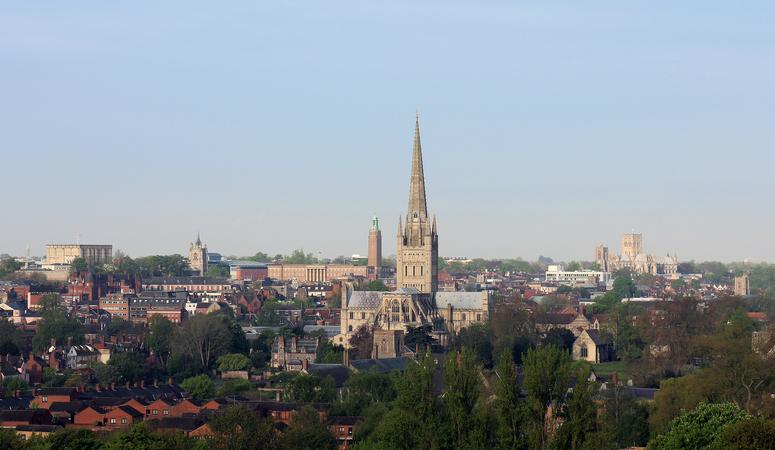How Norwich achieved lowest coronavirus death rates in England
Countless lives almost certainly saved because lockdown came before Covid-19 took hold in city - raising further questions about delay of UK-wide restrictions, finds Colin Drury in Norwich


It is a city perhaps best known for mustard, mediaeval streets and Alan Partridge. Now, it seems Norwich may have another enviable claim to fame.
The East Anglian city has the lowest coronavirus death rates of any local authority area in England and Wales.
Just three people from here had died after being diagnosed with Covid-19 up to 17 April, according to the latest data released by the Office for National Statistics.
The city’s related mortality rate stands at just 2.5 per every 100,00 people. For context, the corresponding average across England and Wales is almost 15 times higher at 36.2. In the worst hit area – Newham in London – that number peaks out at 144.3.
All of which raises an intriguing question: just what are they doing here to keep this grim tally down?
“I don’t think we’ve found a magic bullet,” says Adam Gretton, spokesperson with the Norfolk and Norwich University Hospitals NHS Foundation Trust. The figure, he says, is positive – “but no-one here is jubilant… people are focused on the hard work ahead”.
He is not, as it turns out, the only one keen to play the number down. Managers and medics at the hospital decline to speak to The Independent for fear the news of comparatively few deaths will, in some way, encourage people in the city to break the ongoing lockdown.
Dr Louise Smith, the director of public health in Norfolk, meanwhile, points out that the ONS data only runs to 17 April. “While these figures are welcome,” she says, “the fact is we won’t have a full picture of Covid-19’s impact in our county for some time.”
Indeed, there have been several more deaths in Norwich in the time lag since.
Nonetheless, something here appears to have gone right.
At present, the city’s main Norfolk and Norwich University Hospital has a total 36 intensive care beds and another 60 surge spaces available if necessary. Only four of those 96 were being taken up by Covid-19 patients as of Monday.
“It is excellent news but I think largely it can be put down to pre-existing structural factors, rather than Norwich deviating too widely from the national approach,” says Professor Andy Jones, a lead researcher at Norwich Medical School at the University of East Anglia.
Key among those is the city’s isolation and rurality, he says.
“There’s a saying that no-one passes through Norwich,” he tells The Independent today. “You really only go if you need to be there. In that way, there has been far fewer opportunities for the virus to arrive here.”
As a city, it is by no means uniformly affluent – it was ranked the 61st most deprived area in England in 2019 – but nor does it suffer the same scale of poverty as, for instance, the West Midlands, Greater Manchester or Merseyside. For a virus that strikes hardest at the least well-off – the mortality rate is twice as high in poor areas as wealthy – this is a significant factor.
Similarly, levels of underlying health conditions appear relatively low in Norwich compared with other cities. Conditions such as the lung disease COPD, for instance, do not abound as they do in the North East or South Yorkshire. While Norwich, itself, has roads with pollution levels above World Health Organisation guidelines, such levels plummet in surrounding rural areas.
“If you have a population that is relatively affluent and relatively healthy – and I stress relatively – that population is starting from a strong position in terms of Covid,” says Jones.
Pertinently, perhaps, there is a low non-white population here. Some 92.6 per cent of people here were white according to the 2011 census, compared to 86 per cent on average in England and Wales.
“That’s probably an additional factor,” says Jones. “We know that non-white populations seem to be more significantly effected by Covid. To some extent that seems to be associated with socio-economic deprivation, but there may be some additional susceptibility over and above that which is not really understood at the moment.”
Matthew Packer, the city council’s cabinet member for health, says, in addition, the lockdown has been well-observed – cutting potential transmissions – and that city organisations have worked effectively through the pandemic.
“We absolutely cannot be complacent,” he says. “What I am sure about, though, is that the city has worked as one team with residents, key workers, local authorities, partnership organisations, the police and businesses all coming together to help stop the spread and protect our excellent local NHS – whose magnificent staff have worked tirelessly at the front line.”
Yet, above and beyond all this, there may be one single factor which offers are a far greater – if more disturbing – explanation for the low death toll.
When the UK lockdown was announced on 23 March, Norwich had only a handful of known cases of Covid-19. Its first confirmed diagnosis, indeed, had come just a week before. To all intents and purposes, the city was shuttered before the virus had been allowed to take hold. In epidemic terms, it closed down before most of the rest of the UK.
This may, says Jones, cause some difficulties coming out at the other end. “Norwich won’t have the same levels of immunity as other areas,” he points out.
But it does mean that, if a test, track and trace programme can be deployed effectively when restrictions are eased, then the social pause allowed by the lockdown would have come at precisely the right time to reduce casualties here.
From this, it is perhaps hard to avoid one overwhelming question: if the lockdown had been implemented earlier across the rest of country, how many thousands of lives might have been saved?
Join our commenting forum
Join thought-provoking conversations, follow other Independent readers and see their replies
Comments
Bookmark popover
Removed from bookmarks